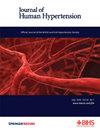A systematic review and meta-analysis of digital interventions targeting lifestyle factors in patients with hypertension
IF 3.4
4区 医学
Q2 PERIPHERAL VASCULAR DISEASE
引用次数: 0
Abstract
Hypertension is a major risk factor for cardiovascular disease, for which the management involves both lifestyle modification (diet, exercise etc) and medication. Digital interventions (mobile applications, websites, and SMS messages) are being developed to facilitate lifestyle change, but their effectiveness remains uncertain. This review aimed to establish whether digital interventions targeting lifestyle factors are effective in reducing blood pressure in individuals with hypertension. A systematic search was run through MEDLINE, EMBASE and the Cochrane Library. 5302 records were screened for eligibility and data on the primary outcome (systolic blood pressure (SBP)) and secondary outcomes (diastolic blood pressure (DBP) and change in lifestyle factors) were extracted from eligible papers. Where sufficient data were available, meta-analysis was undertaken using a random effects model. 17 randomised controlled trials were eligible for inclusion (3040 patients). 12 studies were suitable for meta-analysis. Lifestyle change mediated by digital interventions were associated with a larger SBP reduction than controls (mean difference (MD) −2.91 mmHg; 95% confidence interval (CI) −4.11, −1.71; p value (p) <0.0001). A significant difference was also seen in DBP reduction between groups (MD −1.13 mmHg; CI −1.91, −0.35; p = 0.005). Reporting of other secondary outcomes relating to lifestyle change was too heterogenous for meta-analysis. Digital interventions targeting lifestyle factors were associated with an improvement in blood pressure in patients with hypertension, but interpretation of the results is limited by significant heterogeneity between studies. Further research is required to understand which lifestyle factors, when targeted with digital interventions, result in maximal blood pressure reduction.

针对高血压患者生活方式因素的数字干预的系统回顾和荟萃分析。
高血压是心血管疾病的主要危险因素,其管理包括改变生活方式(饮食、运动等)和药物治疗。正在开发数字干预措施(移动应用程序、网站和短信)以促进生活方式的改变,但其有效性仍不确定。本综述旨在确定针对生活方式因素的数字干预是否能有效降低高血压患者的血压。通过MEDLINE、EMBASE和Cochrane图书馆进行系统检索,筛选了5302份记录,并从符合条件的论文中提取了主要结局(收缩压(SBP))和次要结局(舒张压(DBP)和生活方式因素改变)的数据。在数据充足的情况下,采用随机效应模型进行meta分析。17个随机对照试验(3040例患者)符合纳入条件。12项研究适合进行meta分析。与对照组相比,数字干预介导的生活方式改变与更大的收缩压降低相关(平均差(MD) -2.91 mmHg;95%置信区间(CI) -4.11, -1.71;P值
本文章由计算机程序翻译,如有差异,请以英文原文为准。
求助全文
约1分钟内获得全文
求助全文
来源期刊

Journal of Human Hypertension
医学-外周血管病
CiteScore
5.20
自引率
3.70%
发文量
126
审稿时长
6-12 weeks
期刊介绍:
Journal of Human Hypertension is published monthly and is of interest to health care professionals who deal with hypertension (specialists, internists, primary care physicians) and public health workers. We believe that our patients benefit from robust scientific data that are based on well conducted clinical trials. We also believe that basic sciences are the foundations on which we build our knowledge of clinical conditions and their management. Towards this end, although we are primarily a clinical based journal, we also welcome suitable basic sciences studies that promote our understanding of human hypertension.
The journal aims to perform the dual role of increasing knowledge in the field of high blood pressure as well as improving the standard of care of patients. The editors will consider for publication all suitable papers dealing directly or indirectly with clinical aspects of hypertension, including but not limited to epidemiology, pathophysiology, therapeutics and basic sciences involving human subjects or tissues. We also consider papers from all specialties such as ophthalmology, cardiology, nephrology, obstetrics and stroke medicine that deal with the various aspects of hypertension and its complications.
 求助内容:
求助内容: 应助结果提醒方式:
应助结果提醒方式:


